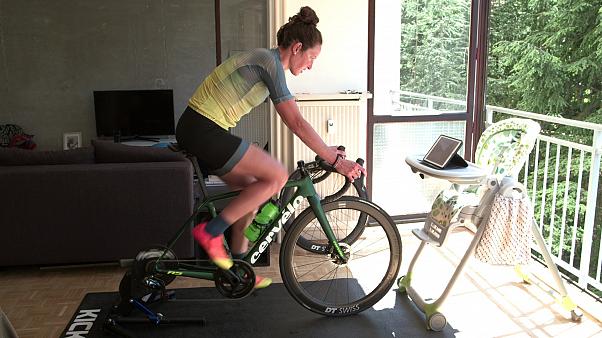Hopes and dreams on hold: the impact of COVID-19 on niche sports

Like every aspect of life, the sports industry – worth globally more than 430 billion euros – has been badly affected by the coronavirus. On an individual level, however, the pandemic has also had a major impact on the vast majority of athletes. The lockdown restrictions across Europe have forced many of them to rethink both their careers and redefine professional futures and goals.
Sports psychologist Makis Chamalidis, co-author of the book “Champion dans la tête” or “Mind of a Champion” -, says the crisis has created, “a moment of uncertainty, with no real end in sight. Weve seen athletes whove managed to do this, get organised, and others who have lost their bearings and had a little more difficulty staying focused.”
[contfnewc]
[contfnewc]
[contfnewc]
The Olympic dream on hold
With almost 100 international medals under his belt, including several European and World titles, Portuguese sprint canoeist Fernando Pimenta had his eyes set on the 2020 Olympic Games in Tokyo.
Like all Olympic athletes, Fernando now knows hell have to wait another year to give it his best shot and live his sporting dream. He says he is going to take advantage of the “extra year, to try to improve, if possible, even a little bit.”
[contfnewc]
[contfnewc]
[contfnewc]
“I would compare it to an injury”
Jeanne Collonge has a calm steely resilience that hides the fire of a champion. Winner of several IronMan events, this endurance triathlete was also the record holder, between 2012 and 2015, of one of the hardest long distance triathlons in the world, the Embrunman.
She stopped her career in 2017 to have a child. She slowly and steadily made her way back and 2020 was supposed to be her big come back year.
[contfnewc]
Jeanne compares the crisis to “an injury”, adding: “at first were in denial a bit. At the beginning were sad or even angry. And then we have to accept it, and above all, do everything we can to get used to the new situation.” Explaining that she feels at her best right now, Jeanne admits: “its a bit frustrating to feel good and not be able to express yourself in a race.”
Adjusting to the new normal
Living in Vermiglio, in the Dolomite mountains, Davide Magnini embodies the spirit of an “outdoor” athlete. At 22, he has already won several world and European ski mountaineering championships and is a rising star in the world of trail running, having won the mythical Marathon du Mont Blanc in 2019. He also came second in last years Golden Trail World Series, behind the “king” Kilian Jornet.
At the beginning it was tough, mentally, to train every day in a garage, on a treadmill. For an outdoor athlete like myself, who trains every day of the year outside, under no matter what conditions, it was tough.
Davide Magnini[contfnewc]
Ski Mountaineer and Trail Runner[contfnewc]
[contfnewc]
[contfnewc]
[contfnewc]
Even if he lives in a small village in the mountains, Davide says that he has strictly abided to the lockdown restrictions imposed by the Italian authorities, given the country’s high rate of infection and knowing many of his fans look to him as a role model.
Niche sports harder hit
Canoeing, triathlon, ski mountaineering and trail running are all high-level sports but dont enjoy the media coverage and worldwide attention of football or tennis.
Athletes in such sports are highly dependent on prize money and sponsorship. No competition means no prize money and, according to the Federation of the European Sporting Goods Industry (FESI), nearly half of all companies in the sports sector have suffered anything from between a 50 to 90 percent loss in revenue.
“There was a moment, when I saw that a lot of companies werent going to be able to hold on – that they would be forced to stop [their activity]… I thought that might be the case for the brands that support me,” says Jeanne.
When not doing triathlon, Jeanne works as a translator and wants to become and mental coach for athletes, insisting that it’s important to “have other strings to your bow”.
Fortunately, for all three athletes, their sponsors have been keen to reassure them of their continued support throughout the pandemic. A survey by the European Sponsorship Association shows that despite the crisis, 72 percent of brands plan to honour their sponsoring commitments.
Strength through adversity
The future of sports competition is still uncertain for many, but with lockdown restrictions easing across Europe, the best athletes are quickly adapting and looking forward to a post-Covid world.
Fernando believes he thinks hell “come out stronger” from this period and still feels he’ll get a chance to compete in 2020, even if its not the Olympics. Jeanne says that “if there are no races”, she’ll work on her weaknesses and “try to progress to be ready for 2021”.
As for Davide, he believes this pandemic will change the world, but “its not going to alter the athletes desire and passion to do what they love most.”
[contfnewc]


